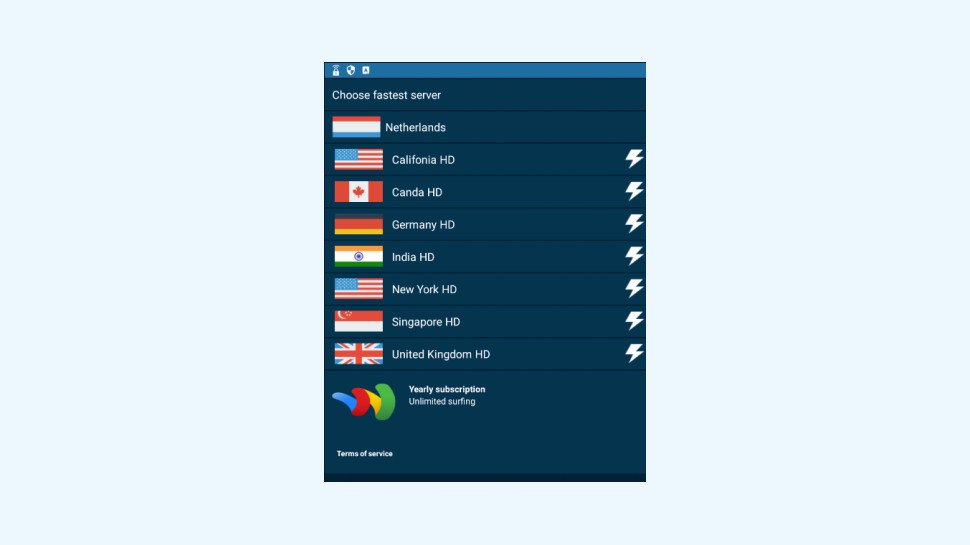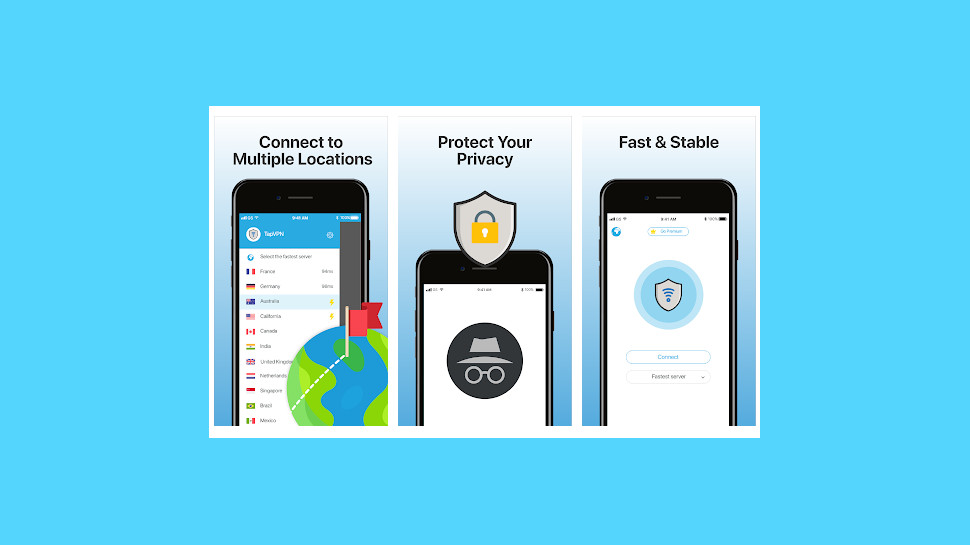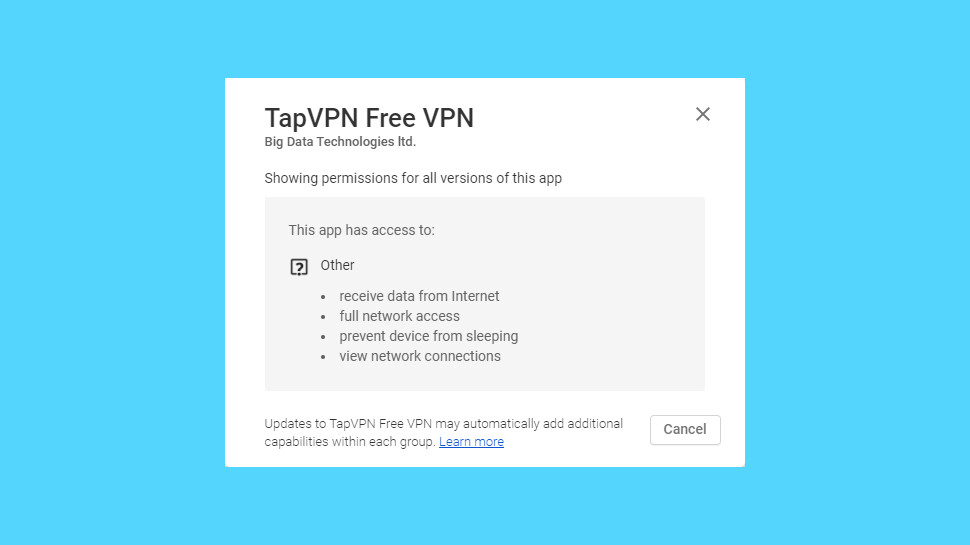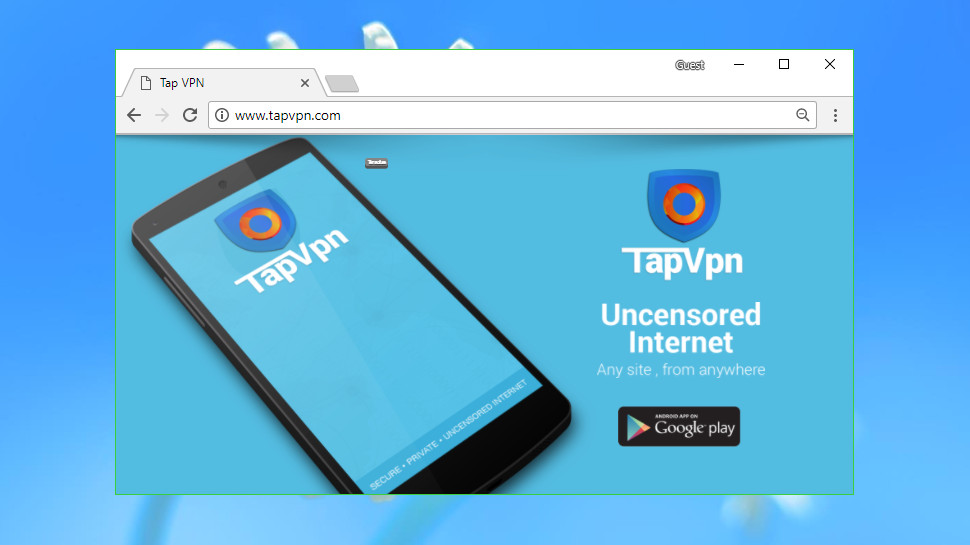TechRadar Verdict
This Android VPN is a user-friendly Netflix unblocker, but beware: TapVPN's privacy policy is a data-collecting nightmare.
Pros
- +
1GB a month free plan
- +
Easy-to-use
- +
Unblocks Netflix, iPlayer
Cons
- -
Collects lots of personal data
- -
Plenty of ads
- -
Below average speeds
- -
Very few features or configuration options
Why you can trust TechRadar
TapVPN is a popular Android VPN app that offers a limited free plan with 1GB of traffic a month.
The free version is stuffed with ads which pop up on connect actions, disconnects and just when they feel like it, apparently; you know how it works.
- Want to try TapVPN? Download it here
That’s the price you pay for a free app, and if this all gets too painful, you can upgrade to an ad-free unlimited bandwidth plan for $3.33 a month on the annual plan.

As well as losing the pop-ups, this gets you access to the full set of locations: California, Canada, Germany, India, Netherlands, New York, Singapore, United Kingdom. It's a small network, and even more so since TapVPN dropped its Australian location, but the servers are at least well distributed.
If you only need an Android VPN, that looks like good value, but keep in mind a company like Surfshark charges as little as $2.50 a month if you pay for two years upfront, and that gets you a far more powerful product which you can install on up to five mobiles, tablets, desktops or laptops.

Privacy
Unusually for an Android VPN app, TapVPN has a website and a privacy policy. We pointed our browser in its general direction, and immediately spotted the lengthy list of personal information TapVPN might collect. Here it is, in full and unedited form:
- First name, last name, mobile phone number, IP address, physical address, email, username and password.
- Device ID, data from apps of third parties installed, manufacturer data, browsing history, bookmarks and network settings.
- Available data regarding malicious applications, files and other potential threats on your device, their behavior and origins.
- Public data collected as you use our Services (e.g. Log Data). Log Data refers to technical information that is automatically collected by us when you use our Services (e.g. error logs, dump files).
TapVPN also points out that if you sign in using a third-party account – Microsoft, Facebook, Google, and so forth – it may also be able to collect your account data, text, archives, photos, bookmarks, info of your contacts and their common contacts, login data and profile information such as ‘about me’, ‘friend lists’ and ‘interests’.
We would normally be more concerned about logging of our VPN activity, but TapVPN doesn't say anything about this at all. It's probably safest to assume that your browsing is being logged at some level, even if only via session data (connect and disconnect times, incoming and outgoing IP addresses.)
Over time TapVPN could build up a substantial amount of data about you, and you shouldn't rely on the company to keep this private. The small print says it may be disclosed 'when commanded under applicable law', 'to encounter any actions that... constitute a contingency or liability for us', 'in response to a valid request or subpoena from a government or law enforcement agency', 'to defend the property, rights and integrity of any of our users, advertisers or licensors' and 'to process, manage and oversee legal claims and processes brought against us by third parties (e.g. takedown notices).'

Finally, we moved on from the small print to check out TapVPN's permissions. In the past it's required access to some very sensitive details - Device & app history, Identity, Location, Photos/Media/Files, more - but the latest build is far less demanding, only asking for the permissions you'd expect for a VPN: View network connections, Full network access, Receive data from internet and Prevent device from sleeping.

Performance
The TapVPN app has a simple and straightforward interface. There's a list of locations to choose from, a Connect/Disconnect switch, a status panel which shows the bandwidth you've used and your upload and download speeds, and that's about it.
And we really do mean 'that's it.' There's no server load or latency indicator, no favorites system, no option to auto-connect when you access insecure networks, nothing at all.
It's much the same story with the app's settings, because, well, there aren't any. That's great if you're looking for simplicity, but experienced users could be frustrated at the lack of control.
TapVPN's site unblocking abilities weren't bad. It failed with Amazon Prime Video and Disney+, but so do plenty of competitors, and it did get us access to BBC iPlayer, US Netflix, US-only YouTube content, and more.
Speeds were less capable. Our test phone comfortably averaged 25Mbps in the review environment, but this dropped to 12-15Mbps when connected to our nearest UK server, and a miserable 4-5Mbps via New York. We've seen worse, and even these speeds are enough for basic tasks, but it's not the 'Super Fast' connection promised on Google Play.
Finally, we ran leak tests across TapVPN's various servers. All servers were in the locations TapVPN promised, and the app shielded our identity by correctly blocking all WebRTC and DNS leaks.
Final verdict
TapVPN could be useful as an easy way to unblock Netflix, but its data collection policies make us nervous and we wouldn't use the service for anything where privacy is important.
- We've also highlighted the best VPN

Mike is a lead security reviewer at Future, where he stress-tests VPNs, antivirus and more to find out which services are sure to keep you safe, and which are best avoided. Mike began his career as a lead software developer in the engineering world, where his creations were used by big-name companies from Rolls Royce to British Nuclear Fuels and British Aerospace. The early PC viruses caught Mike's attention, and he developed an interest in analyzing malware, and learning the low-level technical details of how Windows and network security work under the hood.
